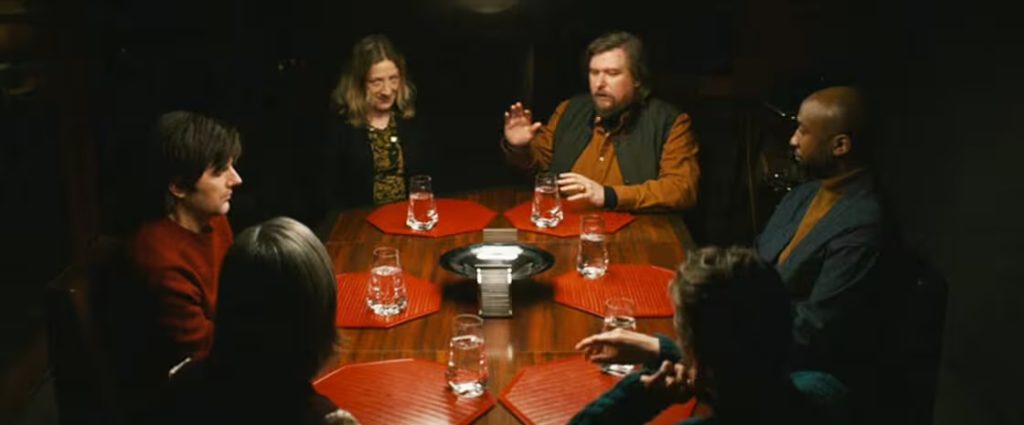”The Good News About Hell,” (S1, E1)

”From the pavement I could see the window of Albertine’s bedroom, that window which had always been dark in the evening when she did not yet live in the house, and which the electric light from the inside, sectioned by the slats of the shutters, now striped with parallel golden bars.” — Marcel Proust
So how does Mark choose to unwind his body from an out-of-mind day at Lumon? He walks robotically to the refrigerator to grab a beer (validating Cobel’s opinion that he looked hung over), doesn’t turn on a light, but flips on the TV to soak in a documentary about the life of a gnat. The voiceover says the gnat will live only three to seven days and it seems in the moment that Mark might feel jealousy for this plight.
Mark lives in a condo community called Baird Creek in what looks to be a lovely, hilly small Northern U.S. community. The community seems to consist of nothing but blue duplex homes, Mark’s being two stories in height, while his next door neighbor lives in a one story flat. He seems like the kind of person who would prefer to never meet his neighbors, but he does know the woman next door named Mrs. Selvig, because she can never get the trash/recycling bin placement right and is taking up his spot, so he has to call her. Mark seems to be taking out his body’s left over aggression from how he was treated the previous day in the office on this woman, who for some reason can’t master simple rules.
It now appears to be the weekend and Mark’s first impulse is to find more alcohol to get through it, this time a bottle of wine, and whatever is on tv to shut off the rest of his brain. But his peace is interrupted by a knock on the door. It’s his sister Devon, reminding him of an appointment. She asks him to put on pants, saying “those are not pants.” They seem to have an easy, banter filled relationship, one where she says he owes going to this event with her because she was a way better sibling growing up.
”So, if there’s no dinner, how is this dinner?” A fair question from Mark. The dinner party without food is the brainchild of Devon’s husband Ricken, who is a frequent target of outrageous fan theories, but seems to be little more than comic relief for the writers. Ricken’s backstory was explored extensively in a free book Apple dropped during season 2, marketed as excerpts from his self-help book “The You You Are.” His pompous, self-important tone is challenged only by his even-more-insane-than-Severance origin story, where we find out that he was the child of parents who put on guerilla theater productions in the late 60s and conceived him during an onstage performance. Whether the story is true or not, it fits Ricken’s mock dramatic tone.
You can tell on the drive over to the party that Devon is not a fan of Lumen. She sees that Mark has been hurt and asks how it happened. He says it’s fine and that they apologized. She asks if they tacked an explanation onto the apology, leading Mark to tell about the gift card. “Oh, you got a gift card. Where is he going to?” That’s an interesting. mocking turn of phrase, since innie Mark isn’t going anywhere. When she hears where, she laughs “of course it’s Pip’s. Well, enjoy!” It makes me think that Pip’s is part of the “company store” of Lumen.
”There’s our captive,” Ricken exclaims as opening the door. Mark responds “Hi, Rick.” He has known him for many years, but Ricken still corrects him and demands to be called Ricken, without the slightest sense of humor.
We then enter the most excruciating pseudo-intellectual dinner/non-dinner imaginable. One guest named Patton seems to enjoy performing most. His first bit is about how life isn’t food, that food is just calories. Ok. Devon then chimes in that Mark and his dad had “whiskey is life” carved on a flask, which just underscores the family predisposition to recreational drinking and perhaps alcoholism. Ricken says the quiet part out loud by calling his (late?) father in law a “misdiagnosed alcoholic.” What a strange phrase. Misdiagnosed with what else?
The group then moves to the topic of Mark being a former history professor with a focus on World War I. This invited Patton, prefacing it by announcing that he read a think piece on the relative levels of violence throughout history, to make another dramatic, idiotic point, that people at the time called it the Great War, not World War I, and that it would be a major “faux pas” to call it that at the time. Mark lets that sit for a beat while clearing it up with the obvious fact that there was no reason to call it World War I until there was World War II. The Algonquin Roundtable, this is clearly not.
Ricken then says that Mark’s ex-wife was a Russian literature professor, then annouces that “Mark is a Lumon man now.” And after a little more small talk, he feels obliged to blurt out that Mark’s job is sensitive enough to warrant the severance procedure. It seems like it should be a universal HIPPA violation to exclaim something like that about another person, but on everyone jumps into the conversation about severance.
They start on familiar ground — is there an “other one”? What does it feel like? — then one participant asks about the logistics of coming and going, leading Mark to talk about the “staggered” times much like his innie did with Helly, except in this context, it sounds like he’s staying they knock you silly in the process. Mark has clearly had a good deal to drink and isn’t completely coherent in his presentation.
Then Patton, an African American male, says that the innie version of you is trapped there. “Well, not exactly trapped, but …” Mark stares at him and says “but what?” This is a tense moment. I don’t know if Patten meant to say that the innie is enslaved at Lumon, but that’s the implication I take away from Mark’s challenge. This leads to a long silent standoff. Another participant then says “I suppose we know where you fall on the congressional goings-on.” It seems like severance has become a national cause celebre.
It’s time now for Ricken to bring it all back with a pompous wrap up, noting that Mark made a decision that was controversial, “ethically and socially, morally, scientifically, but Mark, I stand behind you without reservation.” Mark says “that’s very sweet.” Ricken then pats himself on the back for the deep level of discourse his foodless dinner has elicited.
While they blather on, Mark stares into blank space. Whether we have an opinion at this point about whether innie Mark is a captive, there is no question that outie Mark would rather be almost anyplace else.
